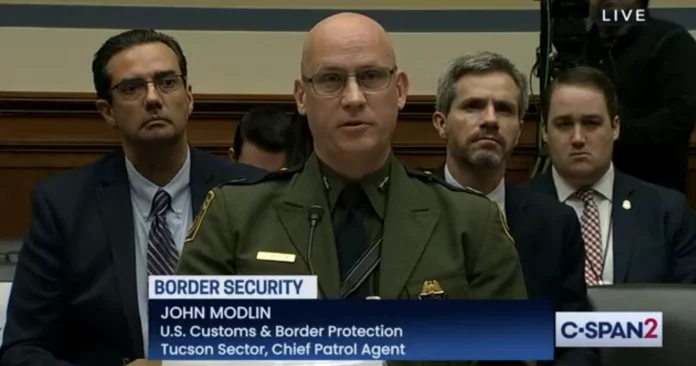
What’s portrayed on national television about large family groups with small children claiming asylum at the southern border isn’t what’s happening in the Tucson Sector of Arizona, Border Patrol Chief John Modlin testified on Tuesday before the House Committee on Oversight and Accountability.
“The most notable factor that sets Tucson apart from the rest of the southwest border is the migrant demographic. It is not what you see on the news,” he said.
“In Tucson, the vast majority of encounters are single adult males attempting to avoid detection. The smuggling organizations to our south are very well organized and resourceful,” Modlin said, referring to Mexican cartels. “Each and every person crossing through the Tucson Sector must pay these criminal organizations. These criminal organizations employ various tactics to move thousands of migrants illegally across the border.”
He reiterated that the majority coming through are single men of military age wearing camouflage to avoid detection by law enforcement.
“The migrants we encounter are completely outfitted in camouflage by the smuggling organizations before they cross,” he said. “Most run from and fight our agents to avoid apprehension. Many are previously deported felons who know they are inadmissible to the United States, and many pose a serious threat to our communities.”
He also explained the tactics the Mexican cartels use to pull Border Patrol agents from the line of border security protection, called “task saturation.”
Task saturation, he explained, “is a term we use to describe a tactic where smuggling organizations split large groups of migrants into many smaller groups. These small groups are then directed to illegally cross the border all at once at different locations, effectively saturating the area with migrants and exhausting our response capability. This tactic, coupled with the remoteness of the area, has a compounding effect and results in large areas of the border being left vulnerable while our agents are responding, rescuing, and apprehending migrants.”
Modlin talked about how the cartels provide those they are smuggling with smartphones for a fee. The phone has map routes and updates input into them using GPS to guide them as they make their way north into the interior of the U.S., he explained. They also use social media apps to recruit American teenagers to drive to the border and load up illegal foreign nationals in their parents’ vehicles for what they believe “is a quick and nonconsequential payday.”
“However, they are wrong,” he said. “The Tucson Sector prosecutes more smuggling cases than any other sector on the southwest border.”
In 2020, total encounters with illegal foreign nationals were 66,000, he said. “That figure nearly tripled in 2021 and then quadrupled last year. We closed last year with over 250,000 encounters; 216,000 were single adults. That is a 257% increase in just two years.” Now, agents are experiencing another 20% increase compared to last year, he testified.
The sector covers territory from the Yuma County line to the Arizona-New Mexico state line. In fiscal 2022, Border Patrol agents in this sector apprehended 264,727 illegal foreign nationals and reported 193,658 gotaways, according to Border Patrol data obtained by The Center Square. The number who were apprehended and evaded law enforcement dwarfed the populations of the towns where Border Patrol stations are located, excluding Tucson – enough to populate 7,052 Whys, 8 Casa Grandes, 24 Nogales, 178 Willcox’s, 584 Sonoitas, 106 Bisbees, 29 Douglas’s, and 95 Three Points.
Republished with the permission of The Associated Press.













